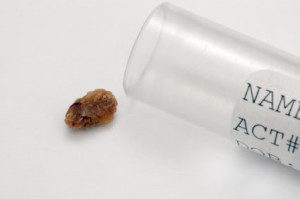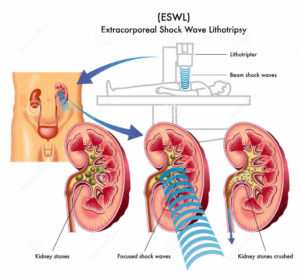 Kidney stones form from tiny crystals in the urine. When the urine is concentrated, these crystals coalesce to form hard deposits. These stones are most commonly made of calcium, but can also be composed of other minerals made in the body.
Kidney stones form from tiny crystals in the urine. When the urine is concentrated, these crystals coalesce to form hard deposits. These stones are most commonly made of calcium, but can also be composed of other minerals made in the body.
What Causes Kidney Stones?
There are many underlying causes of kidney stones. The most common cause is dehydration or inadequate fluid intake. Certain metabolic disorders and diseases (such as hyperparathyroidism) can be associated with kidney stones. Another common cause is a family history of kidney stones. Chronic urinary infection and urinary obstruction can also lead to stone formation. Certain mineral levels in the urine, when too high or too low can either inhibit or promote stone formation. These levels are often affected by foods and beverages found in the common diet.
Types of Kidney Stones
There are four types of kidney stones:
- Calcium Stones: The majority of kidney stones are calcium stones that consist of calcium oxalate. Calcium stones may also occur in the form of calcium phosphate.
- Struvite Stones: Most people suffer struvite stones following a urinary tract infection (UTI) or other types of infection. Struvite stones often grow quickly and occur within any warning signs.
- Uric Acid Stones: Uric acid stones have been shown to develop in individuals who lack sufficient fluids or have a very acidic urine pH. Additionally, uric acid stones may occur due in part to a high-protein diet, gout, or certain genetic factors.
- Cystine Stones: Cystine stones form due to cystinuria, a hereditary disorder that causes the kidneys to excrete an excess amount of certain amino acids.
Determining the type of kidney stone that an individual is dealing with is paramount for proper treatment. Therefore, a urologist performs a comprehensive patient assessment to find out what type of kidney stone a patient experiences. A urologist then crafts a personalized treatment plan to help a patient address his or her kidney stone symptoms.
Symptoms of Kidney Stones
Kidney stones most commonly do not cause any symptoms when lying in the kidney. In fact, many people who have kidney stones do not even know that they have them. However, these small deposits can begin causing symptoms when moving around in the kidney, or when passing into the ureter (the tube draining from the kidney into the bladder) as they pass into the bladder.
These symptoms can include
- back pain under the ribcage
- blood in the urine
- lower abdominal or groin pain
- nausea or vomiting
- urinary urgency or frequency
- burning with urination or intermittent stream
Kidney Stone Diagnosis
Our physicians at Comprehensive Urology begin with a thorough history and subsequent physical examination. A combination of examinations may be performed to help diagnose a kidney stone. These may include urinalysis as well as radiographic examinations (i.e. ultrasound, plain x-ray, intravenous pyelogram, and computerized tomography (CT) scan). These tests may help delineate the location and size of the stone, as well as reveal if there is any evidence of urinary obstruction.
Kidney Stones Treatments
Many kidney stone treatment options are available. Each treatment is designed to help a patient alleviate kidney stone symptoms both now and in the future.
Dietary Modification
Once a kidney stone has been diagnosed, your doctor may recommend certain dietary modifications to help decrease the rate of stone formation. This would be tailored to each specific patient’s clinical situation. Dietary modifications may include increasing fluid intake, increased intake of citrate containing foods (lemons, oranges), limiting salt intake, and limiting red meats.
Medical Treatment
Your physician may also recommend medical therapy to help manage the kidney stone. Certain medications (such as alpha blockers often used for BPH) may help facilitate passage of a kidney stone that is lodged in the ureter. Other medications are used often to help dissolve kidney stones or to help future stone formation.
Surgical Treatment
Surgical treatment may also be offered or recommended depending on each patient’s specific scenario. Reasons to potentially treat a stone include:
- the stone is in the kidney, medical treatment and dietary changes have been made, and the stone is either increasing in size or causing irritative symptoms
- a trial of stone passage has been attempted but it has still not passed and is causing pain
- the stone is causing obstruction of urinary tract and potential damage to the kidney
- the stone is resulting in urinary tract infection
- the stone is deemed too large to pass on its own
Our physicians can help determine if surgical treatment may be right for you.
Extracorporeal Shock Wave Lithotripsy (ESWL)
 Modern day surgical options are all minimally invasive, which allow early recovery and return to normal activities. These options include extracorporeal shock wave lithotripsy (ESWL), ureteroscopic laser lithotripsy, and percutaneous nephrolithotomy (PCNL).
Modern day surgical options are all minimally invasive, which allow early recovery and return to normal activities. These options include extracorporeal shock wave lithotripsy (ESWL), ureteroscopic laser lithotripsy, and percutaneous nephrolithotomy (PCNL).
When stones are located in the kidney and are visible on plain x-ray, they may be treated with shock waves that are generated by a machine which delivers this energy from outside the body, through the skin and soft tissue directly onto the stone. These waves help shatter the stone into smaller particles that may more easily pass through the urinary tract. Sometimes our physician will recommend placing a small tube into the ureter (called a stent) during the procedure in order to help prevent urinary obstruction while these particles are passing.
Ureteroscopy and Laser Lithotripsy
Most stones within the urinary tract can be treated with this technique. It is often recommended for those stones that are found within the ureter or kidney. This technique involves no incisions, but rather involves using a small fiber optic scope device (termed a ureteroscope) and passing it through the urethra, bladder and up the ureter. By using this device, our surgeons can help visualize and extract the stone with small baskets, as well as crush the stone into smaller particles by using a powerful laser beam. At the conclusion of the procedure, the surgeon may elect to leave a temporary stent in the ureter to help assist with passage urine and particles.
Percutaneous Nephrolithotomy (PCNL)
This procedure is often performed when the stone is too large (often larger than 2 cm) or in a location where the stone will not be effectively treated by either ureteroscopy or ESWL (shockwave lithotripsy). This procedure involves making a tiny incision on the back in order to introduce a tube directly into the kidney. Once this access is obtained, our physicians can use a variety of instruments in order to treat the large stone effectively.
Are Kidney Stones Preventable?
Approximately 10% of all people will experience kidney stones at some point in their lifetime. Fortunately, there are many quick, easy ways to reduce the risk of kidney stones, such as:
- Stay Hydrated: Drinking sufficient amounts of water enables a person to dilute substances in the urine that otherwise may cause kidney stones.
- Consume Calcium: The combination of oxalate-rich foods (like grains, legumes, and certain fruits and vegetables) with calcium has been shown to lower a person’s risk of kidney stones.
- Avoid excessive use of Vitamin C Supplements: Vitamin C supplements have been shown to cause kidney stones. However, research indicates vitamin C from food does not carry the same risk. As such, people should strive to get vitamin C from foods rather than supplements.
- Consume Less Animal Protein: Beef, fish, poultry, and pork are primary sources of animal protein that may increase urine acid. Therefore, avoiding significant amounts of foods high in animal protein may help an individual lower his or her risk of kidney stones.
- Consume Less Sodium: A high-sodium diet raises an individual’s risk of calcium kidney stones. But an individual who reduces his or her salt intake can lower his or her urine calcium levels, thereby limiting the possibility of kidney stones.
Despite an individual’s best efforts, there is no guarantee that he or she can permanently avoid kidney stones. Ultimately, kidney stones can affect any individual, at any time. And if a person believes he or she is dealing with a kidney stone, it is important to contact a doctor for immediate diagnosis and treatment.
Kidney Stone Prevention
Once a kidney stone has been diagnosed, our physicians at Comprehensive Urology may order a set of blood and urine tests (termed a metabolic evaluation) that help delineate the levels of certain minerals in the body. These minerals can increase or decrease the risk of stone disease. This information can be used to make dietary as well as medical modifications to help prevent future stone formation.
If a stone has been removed, a stone analysis will help determine the chemical makeup of the stone. This information can also be helpful to our clinicians in order to help formulate a plan for future stone formation.
After these modifications have been made, our team will monitor the response by repeating the metabolic evaluation periodically as well as repeat certain radiographic studies when indicated.
Contact the Kidney Stone Experts at Comprehensive Urology
The kidney stone experts at Comprehensive Urology in Los Angeles help patients identify and treat all types of kidney stones. Dr. Arash Akhavein is a fellowship-trained endourologist who specializes in all the latest kidney stone treatments and minimally invasive surgery. To find out more, please contact us today at (310) 499-2756.